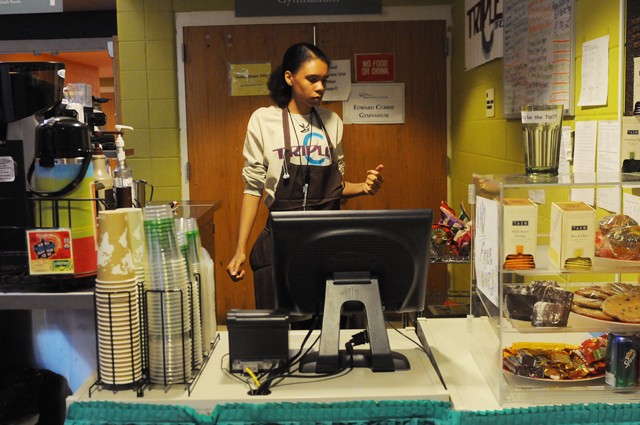For college dropout Khalid Dakane, the Coyle Community Café gives him the money, job experience and training that he wasn’t getting on the streets.
Dakane, 20, is one of three graduates of an entrepreneurship training program. He now works at a coffee shop that opened in the Brian Coyle Center last month.
Since he dropped out of Minneapolis Community and Technical College last year, Dakane said he used to spend most of his time on the streets.
“Instead of being on the streets, I can be here, working and getting paid,” he said.
The youth-run Coyle Community Café aims to keep at-risk Cedar-Riverside youth off the streets.
The café gives confidence to 11 college and high school employees who had difficulties finding jobs in the city, said Abdirahman Mukhtar, University of Minnesota alumnus and Youth Program Manager at the Coyle Center.
Most of the employees completed the six-week entrepreneurship training program provided by the African Development Center, a local organization that seeks to make the Cedar-Riverside neighborhood more economically stable.
Business Development Director Hussein Farah said the program was the first time the development center offered such training for youth.
“I was impressed by their level of energy and commitment,” Farah said. “It was amazing how they kept coming back for more and trying to apply the lessons for their business plans.”
Things have not been the same for Dakane, a proud employee, since he found the job.
After becoming a part-time employee, Dakane said he is spending most of his time at the Coyle Center instead of on the streets with nothing to do.
The training inspired him to go back to school to pursue a business degree.
“I’d like to be a businessman and open my own halal grocery store in the future,” he said.
With violence on the rise in the Cedar-Riverside neighborhood in recent years, some blame fathers for not being good role models for their children.
Abdirashid Abukar, an elementary education major and Somali Student Association academic affair coordinator at the University, said fathers are to blame for the risky behaviors of many Somali youth in Minneapolis.
It is common in the Cedar-Riverside community for fathers to be inactive in household activities, Abukar said.
Youth program workers also emphasized that fathers don’t contribute to their children’s discipline as much as mothers do.
“It’s mostly the mother that we deal with and share the children’s stories,” Mukhtar said. “We don’t see fathers asking us about their children.”
Mukhtar hopes the Coyle Community Café will attract fathers who wouldn’t otherwise be active in their children’s lives.
“What is better than fathers spending their days around the same area where their children hang out?” Mukhtar asked.








